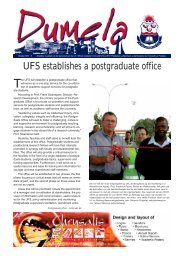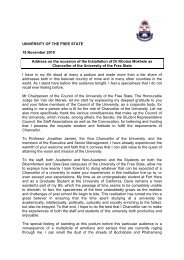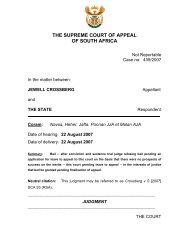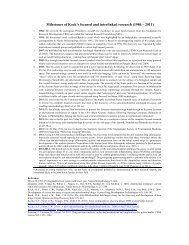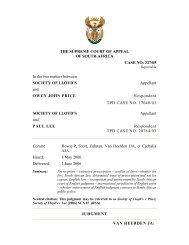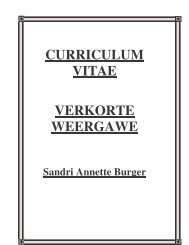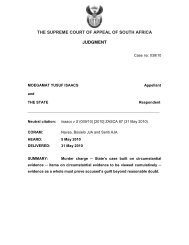THE SUPREME COURT OF APPEAL OF SOUTH AFRICA ...
THE SUPREME COURT OF APPEAL OF SOUTH AFRICA ...
THE SUPREME COURT OF APPEAL OF SOUTH AFRICA ...
Create successful ePaper yourself
Turn your PDF publications into a flip-book with our unique Google optimized e-Paper software.
11Lunden) the judgment must be enforced in the court which granted the original order.When a party leaves a High Court with an order in his favour (not obtained ex parte) thoseproceedings have been effectually completed (subject to appeal or in the case of aninterim order, its confirmation). A subsequent breach of the order or wilful disobedience toits terms outside the jurisdiction of the court gives rise to a right in the holder to take stepsto enforce the order wherever in South Africa he may find the defendant. To holdotherwise would negate the statutorily-created country-wide enforcement of judgments.Should the court approached by the complainant decide that, because of reasons peculiarto the case before it, the issue of contempt would more appropriately or conveniently bedecided by the court which made the order, it might decide to exercise its powers totransfer the case to that court. 2[35] Nor do I agree unreservedly with the proposition that ‘contempt of court is not anissue inter partes; it is an issue between the court and the party who has not complied witha mandatory order of court’: Federation of Governing Bodies of South African Schools(Gauteng) v MEC for Education, Gauteng 2002 (1) SA 660 (T) at 673D-E. When an ordermade in civil proceedings is disobeyed, the party in whose favour the order is made willbring the breach to the notice of the court if he has an interest in doing so (eg in seeking toenforce his judgment). The onus is upon that party to establish the contempt andpersuade the court that sanction is merited; only on the rarest of occasions will the courtinitiate such proceedings itself.[36] Counsel for the respondents boldly claimed support for his argument in thecommon law, which, so he submitted, restricted the power to try contempt proceedings tothe court whose order was said to have been disobeyed. In addition to the authorities citedabove he referred us to In re Dormer (1891) 4 SAR 64 and Luyt v Luyt 1926 WLD 179.But neither case addresses proceedings for contempt in a high court in respect of an ordermade by another high court in a dispensation remotely similar to that which now exists.Nor does either lay down a principle which is opposed to such enforcement. Indeedcounsel was unable to formulate any principle that could justify such a limitation.2 Section 3(1)(b) of the Interim Rationalisation of Jurisdiction of High Courts Act 41 of 2001.




